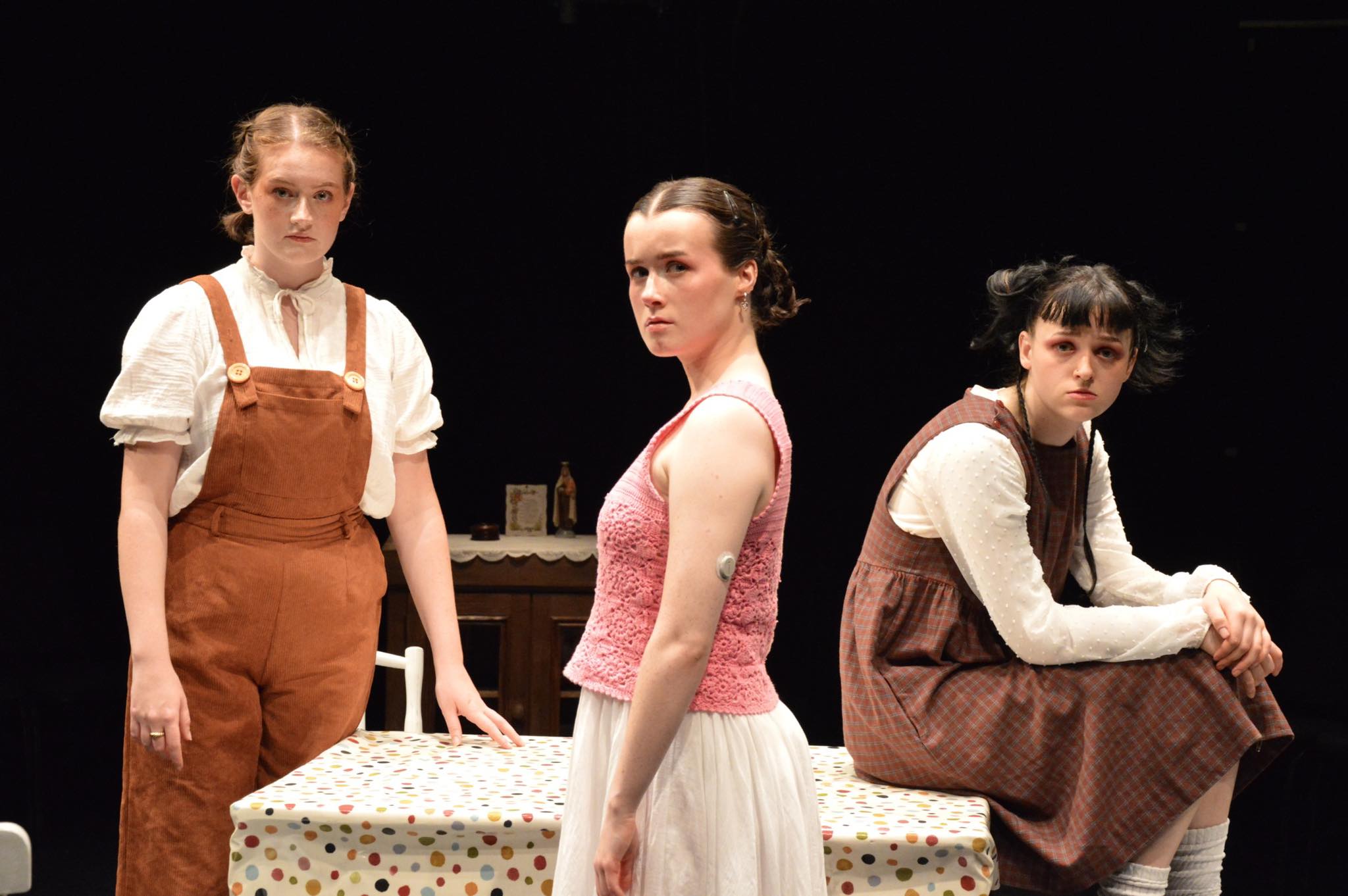
American author Joan Didion wrote: ‘We tell ourselves stories in order to live’. This idea is at the root of Uncanny Valley, the show that new Trinity-based theatre company Aimsir Theatre will be bringing to this month’s Edinburgh Fringe. The show is written by Aoife Cronin and co-directed by Cronin and Lucy Bracken, the founders of Aimsir Theatre. August 8th and 9th saw two preview shows in the Players’ Theatre before the cast and crew set off for a run in Edinburgh
The show presents three adult daughters who tell each other stories to cope with the fact that their fundamentalist Christian mother has abandoned them without explanation. The show opens with a frantic dance, as the daughters move around the central kitchen table in a controlled chaos. The daughters then cycle through stories that were central to their early understanding of the world. They don’t retell these stories in their own manner, instead they recount the tales by heart, through the voice of their mother. The world constructed by their mother is slowly revealed to the audience, including the detail of the ‘judgement day cupboard’ that sits ominously to the side, filled with non-perishables, prepped for the apocalypse. Each daughter provides her own story of her childhood and her relationship with their mother.
The eldest, Naomi, goes first in telling her stories. It is clear from early on that the daughters’ understanding of the world and of themselves is built upon the foundations of these stories. By telling ‘their’ stories, they take ownership of them and define their similarities to, and differences from one another, through them. All of their beliefs have been filtered through their mother, who hangs with significant presence throughout the play. Phoebe, the youngest, tells of her early childhood and the stories that had an effect on her, bringing us to the day her mother left. The revelation of the mother’s abandonment halts the breakneck speed of the first half, with three interweaving trains of thought barrelling towards the audience, leaving few opportunities for them to catch their breath. This event is initially faced with a silence, but soon the daughters get to telling their own stories as explanations of why this has happened. They look at the ‘days before the flood’, seeking clues that may help them to form a narrative, an explanation. In the absence of sense, they attempt to create it, but are left fighting over whose story is the right one, whose explanation fills the space that their mother left. The daughters dig their heels and desperately cling on to their ownership of these stories.
God is far away from this kitchen, as are men altogether. Their father (referred to as ‘our father’ by the daughters, as though they are about to launch into the Lord’s Prayer with each mention of him) is rarely referred to and always dismissed. The daughters soon find that their mother’s Christianity was merely her way of understanding the world, and when it doesn’t do the same for them, they are left with very little. Christianity could be a stand-in for any belief system that one may base their worldview on — every one of them is just as fragile as the next. Many contemporary Irish art pieces that deal with religious trauma seem to isolate the audience with intensely personal stories and perspectives. But while Cronin’s writing doesn’t leave you with many memorable one-liners or quotes, the writing achieves a general, focused feeling. It is truly accomplished writing.
The standout performance was that of Juliet Arpaç, in the role of the middle child, Ruth. While Naomi and Phoebe relate directly to the view of ‘good’ that their mother stood by (the name Naomi literally means ‘good in a Biblical context’, while Phoebe, in her monologue, insists that as a child, ‘[she] was good’), Ruth is left out. Arpaç presents Ruth as nervous — a powder keg. She fidgets and her eyes dance around. Therefore, towards the final third, when Ruth finally explodes, it is earth-shattering. Arpaç’s performance of this outburst is deeply affecting, but Ruth seems to be none the better for it, becoming even more isolated somehow. They are all isolated. Their names, their stories, and, even after her departure, their mother, are all the characters have to call their own after the catastrophe, after judgement day. Their mother is raptured, in a sense, and they are left, denied heaven, scrounging for a solid story.
In my interview with the co-directors, Bracken notes how ‘Irish’ this play seems to audiences. I believe that this play is Irish in the way that Brian Friel’s plays are Irish. It looks beyond our island and attempts to live beyond our island through the telling of its own story, a universal story. Though I may have been left wanting a little more, it would be wrong to be ungrateful and to not fully appreciate a piece like this emerging from Trinity and launching at the biggest arts festival on the planet. I wish Cronin, Bracken, the cast, the crew, and all at Aimsir the very best of luck in Edinburgh.
★★★★
Uncanny Valley will run from August 19th – 24th at TheSpaceUK on Niddry Street, Edinburgh. Tickets are available through Aimsir’s Instagram – @aimsir.theatre






